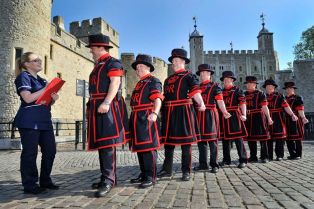London health services facing blood shortage ahead of Olympics
27 June 2012
New statistics from the UK blood services, NHS Blood and Transplant (NHSBT), show a gap between demand and supply of blood type O Rh Negative (O Negative) this summer.
They underline an urgent need for O Negative donors to come forward ahead of the Olympics in July.
The publication of the statistics coincided with the annual World Blood Donor Day earlier this month. NHSBT marked the occasion with a special blood donation session at the Tower of London, collecting blood from the Beefeaters.
Around the jubilee celebrations demand for type O Negative blood was 69% higher than the number of donations being made, mirroring past public holidays such as Easter (25% higher demand than donations) and Christmas (29% higher demand than donations).
All blood types are needed to build stocks in advance of an exceptionally busy summer, but there is a particular need for O Negative donors to prepare for The Olympics. An estimated 1.2 million people and 15,000 athletes are expected to visit London as part of the Olympic Games, whose blood type may not be known, so should they need a transfusion O Negative blood is likely to be needed. The increased demands on stocks will be compounded by low numbers of donors coming forward in the midst of the disruption and distraction of the celebrations.

Beefeaters at the Tower of London roll their sleeves up to give
blood as part of a drive to build stocks ahead of the Olympics. (PRNewsFoto/NHS
Blood and Transplant).
Universal blood type
Type O Negative blood, often called the universal blood type, can be transfused into any patient regardless of their own blood type and is used in over a tenth (10.5%) of hospital procedures. Increased demand during holiday periods is often due to health services preparing for treatments over holiday periods including accidents, which may require O Negative blood to treat patients quickly when their blood group is not known.
Although O Negative blood is in the highest demand, it is also in very limited supply. An estimated 7% of the eligible population (2.38m people) have O Negative blood and just 139,000 of these are donors, a number that has declined 19% in the last ten years. Their contributions are vital for treatments of other blood groups in emergency situations but also to treat others of their own blood type since they can only be transfused with O Negative blood.
NHSBT spokesperson Jon Latham said: "Without O Negative blood donors many live saving procedures could be delayed or made more risky for patients and of course we wouldn't be able to give transfusions to people with O Negative at all since they can only take blood of their own type. We're appealing to this elite group of blood donors to help us prepare for the unprecedented demand expected around the Olympics to make sure our health services have the essential stocks they need. And if you don't know whether you are O Negative or not, donating blood is the perfect way to find out!"
Further information
People of all blood types who would like to help with the national stock build appeal are encouraged to act now before the Olympics and make an appointment at http://www.blood.co.uk or by calling 0300-123-23-23.
Blood facts
- A 30% blood stock build increase is needed to combat the drop in donations as people become distracted and their day to day routines are disrupted by the celebrations. Over 1 million additional visitors to the UK could also add to demand for blood due to illness or injury during the Games.
- New donation criteria recently introduced by NHS Blood and Transplant means that men can now donate blood more frequently bringing their total annual donation opportunities to four times a year.
- There are four main blood groups — O, A, B and AB. Group O is the most common and therefore the most in demand. Over 95% of the blood collected is processed into its main components — red cells, platelets and plasma. A regular supply of blood is vital as red cells last only 35 days and platelets only seven days.
- Negative blood types are rarer among our indigenous population, which places more need on people of these blood types to donate.
- Compared with global blood types, however, the UK has a lower than average percentage of types B+ (8% UK vs. 20% global) and AB+ (3% UK vs. 5% global) creating a potential greater need for these blood types.
- NHSBT collects approximately two million units of blood each year from 1.4 million blood donors.
- The NHS needs 7,000 voluntary donations of blood daily.
- Around 4% of the eligible population are active blood donors.
- A unit of blood is measured as 470mls (or just under a pint).
- Female whole blood donors can give blood every 16 weeks, while male blood donors must wait 12 weeks between donations.